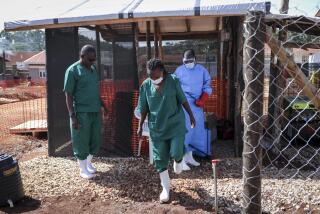Peace Corps Workers to Take AIDS Test Before Going Abroad
- Share via
WASHINGTON — Beginning Monday, the Peace Corps will require all new volunteers to be screened for infection with the AIDS virus, The Times has learned.
It is the fourth federal agency to institute AIDS antibody testing; and its decision reflects, among other things, growing pressure on the United States by foreign nations to prevent infected Americans from spreading or introducing the deadly virus within their borders, according to several public health sources.
“I don’t know that any country has said anything in a memo, or in writing, but there is an attitude, a perception that is in the air--other countries are saying: ‘We don’t want your people unless they’re clean,’ ” said one federal health official, who requested anonymity.
Others Taking Test
The official said that such sentiment from abroad similarly influenced the military, which requires all of its personnel to undergo the test, and the State Department, which recently began screening Foreign Service employes and their dependents. The test is mandatory for applicants to the Labor Department’s Job Corps program also.
Peace Corps officials, who have not made the new policy public, denied Friday that they had acted in response to pressure from abroad. Their decision to screen all volunteers who have not left the United States for overseas assignments “grew out of our concern for the health and safety of our volunteers abroad,” according to Peace Corps spokeswoman Alixe Glen.
But she added: “We are guests in countries and consider that a heavy responsibility.”
There are no plans to test volunteers already stationed overseas.
Motivated by Safety
One public health official with an international perspective on the AIDS epidemic agreed that the Peace Corps policy originated with the agency’s desire to ensure the “safety and management of their people overseas.”
But he added: “It was not the only reason. This pressure from abroad exists--and was certainly one of the factors that led to this.”
Another federal public health official said: “Clearly, Americans are viewed as a source of infection. The opportunity for introduction and transmission in countries which don’t have infection is there, particularly in remote areas where the Peace Corps is. They know their kids are going to be sexually active. The Peace Corps can’t be in a position of letting this happen.”
Several countries have already voiced concern about the entry of AIDS or have instituted policies barring infected foreigners. Japan announced this week that it would seek to restrict foreigners found to be carriers of the virus, and Saudi Arabia and Indonesia announced similar policies earlier.
AIDS in Philippines
The government of the Philippines has expressed fears that servicemen at two American bases there were responsible for introducing AIDS into that country.
The new policy will affect about 2,500 applicants every year, Glen said. The Peace Corps currently has 6,000 volunteers serving in 62 countries, and none have actually contracted AIDS thus far, she said. However, several volunteers who decided on their own to take the test were found to be infected, she said.
“Those who test positive are medically separated,” she said. “They are brought home for further testing and counseling and are given the option of resigning or closing their service early.”
Tom Stoddard, executive director of Lambda Legal Defense and Education Fund, a gay rights organization that is suing the State Department, called the Peace Corps decision “a moral and legal outrage” and said his group would explore legal options to block the Peace Corps testing program.
Doesn’t Ban Homosexuals
Unlike the military, the Peace Corps does not ban homosexuals, Glen said. In the United States, the disease has primarily afflicted homosexual and bisexual men, intravenous drug users and their sexual partners.
Glen said the Peace Corps has an extensive AIDS education and counseling program. Also, she said, the agency is cooperating in a study sponsored by the federal Centers for Disease Control in Zaire, where AIDS is widespread. Volunteers’ blood is tested for infection with AIDS and hepatitis B on arrival and departure, she said.
“The study began two years ago and, thus far, no volunteers have contracted anything,” she said.
The AIDS antibody test determines whether an individual has been exposed to the virus, not whether he or she will contract the disease. However, a person who tests positive is considered infected and infectious to others.
Mandatory Tests Rejected
Earlier this week, about 800 public health officials and others met in Atlanta to debate expanded use of the test and overwhelmingly rejected mandatory testing of any kind. Further, they called for new legislation to prevent discrimination against infected persons and to protect against breaches of confidentiality of test results. In addition, they endorsed wider voluntary use of the test.
AIDS, or acquired immune deficiency syndrome, destroys the immune system, rendering the individual powerless against otherwise rare infections and cancers. The virus can also invade the central nervous system, causing serious neurological disorders.
More to Read
Sign up for Essential California
The most important California stories and recommendations in your inbox every morning.
You may occasionally receive promotional content from the Los Angeles Times.













